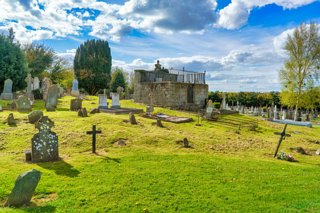ABOUT THE EDWARD BYRNE MEMORIAL IS SAGGART
Byrne, Edward (1739/40–1804), merchant and chairman of the Catholic Committee, was a son of John Byrne of Saggart. Having been apprenticed to a Dublin merchant named Toole, Edward Byrne made a fortune as a distiller and sugar-baker, and had interests in trade with France and in textile manufacturing, eventually acquiring the reputation of being the wealthiest catholic merchant in Ireland.
A member of the Irish house of commons stated in 1792 that Byrne paid ‘£100,000 a year duty to his majesty's revenue’, and the Dublin Evening Post stated at the time of his death that ‘he has paid into the Revenue larger sums than any individual in this country’ and his ‘property is almost incalculable and there are few London merchants who possess more’. But when, in July 1793 (fifteen months after the passing of the act allowing catholics to be admitted to full membership of trade guilds), Byrne applied to join the merchants’ guild he was blackballed.
The Catholic Committee was a county association in late 18th-century Ireland that campaigned to relieve Catholics of their civil and political disabilities under the kingdom's Protestant Ascendancy. After their organisation of a national Catholic Convention helped secure repeal of most of the remaining Penal Laws in 1793, the Committee dissolved. Members briefly reconvened the following year when a new British Viceroy, William Fitzwilliam, raised hopes of further reform, including lifting the sacramental bar to Catholics entering the Irish Parliament. When these were dashed by his early recall to London, many who had been mobilised by the Committee and by the Convention, defied their bishops, and joined the United Irishmen as they organised for a republican insurrection.
A member of the Irish house of commons stated in 1792 that Byrne paid ‘£100,000 a year duty to his majesty's revenue’, and the Dublin Evening Post stated at the time of his death that ‘he has paid into the Revenue larger sums than any individual in this country’ and his ‘property is almost incalculable and there are few London merchants who possess more’. But when, in July 1793 (fifteen months after the passing of the act allowing catholics to be admitted to full membership of trade guilds), Byrne applied to join the merchants’ guild he was blackballed.
The Catholic Committee was a county association in late 18th-century Ireland that campaigned to relieve Catholics of their civil and political disabilities under the kingdom's Protestant Ascendancy. After their organisation of a national Catholic Convention helped secure repeal of most of the remaining Penal Laws in 1793, the Committee dissolved. Members briefly reconvened the following year when a new British Viceroy, William Fitzwilliam, raised hopes of further reform, including lifting the sacramental bar to Catholics entering the Irish Parliament. When these were dashed by his early recall to London, many who had been mobilised by the Committee and by the Convention, defied their bishops, and joined the United Irishmen as they organised for a republican insurrection.

ABOUT THE EDWARD BYRNE MEMORIAL IS SAGGART